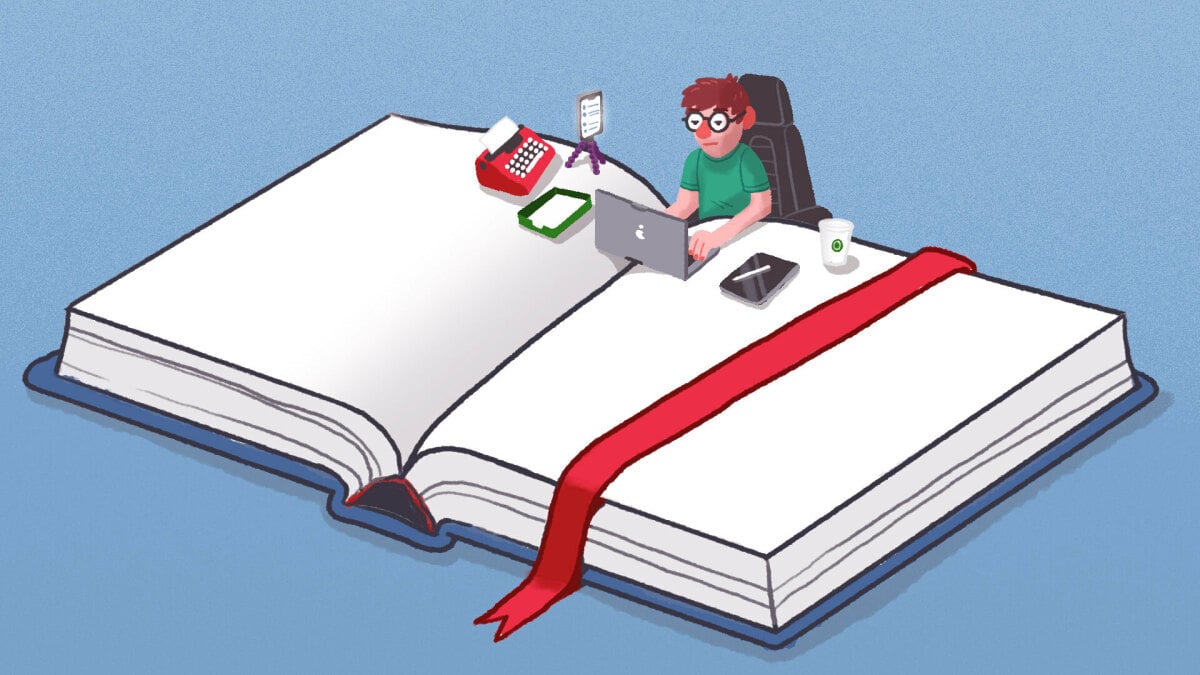SOCIAL
For authors, social media is a powerful tool for self-promotion. It also causes burnout.

Authors can no longer succeed in their craft by writing alone. They must embody multiple roles: writers, publicists, digital marketers, and social media managers. They must be rabid in their self-promotion and steadfast in their personal branding. They have to produce viral tweets, create viral TikTok videos, and optimize their Instagram accounts so that they can get paid to do the work they want to do.
In 2023, writing a book is the easy part.
That’s not to say that self-promotional branding is a novel concept for writers. In the 18th and 19th centuries, authors pulled off some wild stunts to build their brands in newspaper column inches. In the 1920s, Virginia Woolf went shopping with Vogue. Ernest Hemingway did photo ops on safaris and fishing trips. John Steinbeck posed for beer ads. And beyond that kind of classic self-branding, promotion in the 1900s involved a significant amount of personal networking. Anne Sexton, for instance, became a literary star not only because she was an exceptional poet, but also because she was the daughter and wife of salesmen and excellent at self-promotion, as Joy Lanzendorfer pointed out in LitHub. Sexton, who won the Pulitzer Prize for poetry in 1967, tried aggressively to get her work seen. She was ambitious, sending her poems to dozens of publications at a time and hunting down poets she admired, flirting with them, and then demanding they mentor her.
Today, that kind of branding and gumption is still necessary. According to a 2018 study from Paul Ingram of Columbia Business School and Mitali Banerjee of HEC Paris, “artists with a large and diverse network of contacts were most likely to be famous, regardless of how creative their art was.” Now, as our ability to connect with people across the world deepens thanks to social media, writers and artists are held to an even higher standard of networking and connection. This can, of course, be a good thing. In the early 1900s, many people — particularly women, people of color, and those who earn less — weren’t allowed in the same rooms as the successful artists of their day, ensuring their success would be limited by the connections they could make. While racism, sexism, and classism still exist online, social media has burned down some walls.
It has also given authors another requirement for success: virality.
In an era where self-promotion and personal branding reign supreme, authors are under immense pressure to have a social media presence in order to establish themselves as successful writers. And for good reason — BookTok has led to a pretty significant increase in sales for some authors who have gone viral on the platform. But this pressure, while potentially beneficial, can also be a terrible sentence.
Take Nate Lemcke. He wrote a book, Manic Pixie Egirl, and took to social media to promote it. Lemcke decided to read and review a book written by a female author every day until his book made it to the New York Times bestseller list. While attempting to use BookTok to pull in readers isn’t a terrible strategy, he was accused of exploiting the community for his own gain.
“You wrote a book about a self-absorbed man who uses and abuses women. And then, to promote it, you… began to talk about books written by women to appeal to those female readers who control this space,” user @michael.laborn said in a response video. “You are exploiting women. You are using female authors to get you book sales.”
Lemke’s book was being throttled with so many one-star reviews on GoodReads that the platform had to put a hold on reviews altogether. If you searched his name on TikTok, dozens of videos would populate calling him out for his overt sexism and being seemingly uninterested in introspection. He reached virality, which was his goal, even if the reaction was overwhelmingly negative. And, when I spoke to him, he didn’t seem to care.
“If it comes to having to start a gender war on BookTok to sell my book, then [that’s] better than being a waiter until I’m 65,” he told Mashable. “Maybe I’m a sociopath to say that.”
Before the TikTok drama, Lemke had sold fewer than 50 copies of his self-published book. In the month following the drama, he sold 3,000 copies.
Authors feel the push to go viral online — even if it goes terribly and reveals the worst parts about yourself, you’ll still sell more books than if you were silent. Of course, ruining your reputation can hurt your relationship with your publisher, but Lemke’s novel was self-published; he didn’t have much to lose.
Social media platforms offer writers a direct line of communication with their audience, allowing authors to better understand their readers and create a sense of community. In an age where readers often crave personal connections with authors, social media has become a critical tool for building and maintaining these relationships (thanks, John Green).
“Having that social media presence can bring in more fans and get your work noticed more, so there’s always that push to be noticed, to have that hope for that viral moment,” Andrea Stewart, the Sunday Times bestselling author of The Drowning Empire trilogy, told Mashable. “There is some pressure from publishers as well.”
Stewart posts on Instagram, X/Twitter, TikTok, and more platforms just about every day. Her contract didn’t include a social media clause — something that’s become more and more popular among newer writers — but her publisher did send her a social media guide. The guide explains how to post on which social media sites, what kind of content does best on different sites, and when you should post about promotions on Audible or Kindle.
“There’s nothing that they say directly that says you have to be on social media, but the fact is that it is expected,” Stewart said. “It’s this unspoken rule.”
Victoria Aveyard, the New York Times bestselling author of the Red Queen series, also doesn’t have a social media clause in her contract. Still, she posts on Instagram, TikTok, and X/Twitter daily — on top of being on deadline for her newest book.
“I do understand the need, and the benefit [of posting on social media], but it can be extremely overwhelming for an author,” Aveyard told Mashable over email. “Especially debuts, who realize upon selling a book that writing the manuscript was only half the job. Now we have to help sell it! And most of us have no idea how to do that, or where to even start.”
Some authors have language in their contracts that requires them to post and promote their work weekly on Instagram, X/Twitter, and TikTok. These kinds of social media clauses change depending on who the writer, agent, and publisher are, and not everyone has one. However, the requirement to be online adds a great deal of work for the writers. It’s not that social media equates to book sales in a one-to-one ratio. Because, as Stewart says, there just is a limited amount of real-time data.
“We don’t know when we make a post on social media whether or not that’s moving the needle or it’s something that the publisher is doing marketing-wise,” Stewart said. “There’s that vagueness, so you feel like you have to do it because you want to do everything to make your book succeed. That’s part of the package.”
And, as Aveyard said, despite the lack of data, “a good social media presence helps me sell books. It helps my backlist and my frontlist. It helps new readers find my old books and old readers find my new ones.”
However, posting so frequently takes away from writing. Creating videos and posts every single day takes time and creativity — both of which are necessary for writing and can feel limited. You can batch content, sure, but ultimately there’s an aspect of social media that requires you to be online, responding to comments in real-time.
“[Social media] is one million percent a distraction, and I find I have less time to write as I maintain an active social media presence,” Aveyard said. “Maybe I should have a social media manager or someone to help me edit content, but currently it’s just me, and I hope that helps my platforms feel genuine. I tell myself it’s all in service of the job and keeping my books front of mind for readers. Sometimes that’s true. Sometimes it’s bullshit.”
The metrics-driven nature of social media can also be disheartening for authors. The pursuit of likes, shares, and followers can sometimes overshadow the true essence of writing — the love for storytelling and the desire to connect with readers on a deeper level. Authors may feel disappointed if their posts do not receive the expected engagement, leading to self-doubt and a sense of inadequacy.
But it’s not all bad. Posting on social media can help authors foster relationships and create communities online with other people who fully understand their struggles.
“I want to keep writing forever and to do that in traditional publishing, I need to keep selling,” Aveyard said. “It’s time-consuming, it’s stressful, but it also gives me some illusion of control in a profession in which I have very little. And frankly, I do enjoy a lot of social media and making content. It helps me connect to my readers, understand what they connect to in my work, and just feel like I’m not alone in my work. If I didn’t enjoy it, I don’t think I would have the audience I do now.”

















